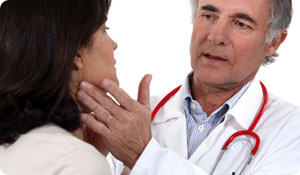
When you consider the side effects of cancer, what comes to mind? You probably think about pain and the presence of a noticeable lump (at least for common cancers such as breast or prostate cancer).
According to the National Cancer Institute, early cancer does not usually cause pain, which makes it not a very good early warning symptom.
Despite the lack of pain, cancer can make its presence known in many ways, although some symptoms are a bit vague and ambiguous.
Cancer side effects often mirror those of other (often less serious) conditions, delaying an accurate diagnosis. In some cases, individuals don't have any indication something is awry until they discover they have cancer during a routine blood test or unrelated procedure.
General Cancer Symptoms
The symptoms and side effects of cancer can vary depending on the type of cancer. However, you may notice one or more of these common problems:
- Sores that do not heal
- Hoarseness or cough
- Changes in bowel or bladder habits
- Discomfort after eating
- Trouble swallowing
- Unexpected weight loss or gain
- Unusual bleeding or discharge
- Feeling tired or weak
- Bone pain or tenderness
- Frequent infections
- Sweating, fever, or chills, especially at night
Specific Cancer Symptoms
Some side effects generally accompany specific types of cancer. For example:
- Pain during sex can be a symptom of uterine cancer.
- People with leukemia may notice swollen lymph nodes or they may start bleeding or bruising easily.
- Sudden difficulty having an erection is a possible sign of prostate cancer.
- Any change in shape, color, size, or feel of an existing mole (or a new mole) may indicate melanoma.
Diabetes and Cancer
There is a strong association between diabetes and cancer, particularly pancreatic cancer. Diabetes may be both a risk factor and a symptom of pancreatic cancer, and people with diabetes are twice as likely to develop pancreatic cancer as non-diabetics. Rapid-onset diabetes, or a sudden change in blood sugar control in someone who already has diabetes, may be red flag for cancer.
Listen to Your Body
Fortunately, most common cancer symptoms are not the result of cancer. Being proactive about your health means recognizing what's normal for you—and what's not. If you have any unexplained symptoms that persist, see your physician to determine the cause. With all the advances in cancer treatment, many patients have a favorable prognosis when they find cancer early.
Sources:
National Cancer Institute. "Fever, Sweats, and Hot Flashes (PDQ®). Web. 12 January 2010.
http://www.cancer.gov/cancertopics/pdq/supportivecare/fever/Patient/page3
National Cancer Institute. "What You Need To Know About Cancer." Web. 4 October 2006 http://www.cancer.gov/cancertopics/wyntk/cancer/page5
Pancreatic Cancer Action Network. "Diabetes and Pancreatic Cancer." Web. http://www.pancan.org/section_facing_pancreatic_cancer/learn_about_pan_cancer/diet_and_nutrition/Diabetes.php
Mayo Clinic. "Diabetes and cancer." Web.
http://www.mayoclinic.org/medicalprofs/diabetes-and-cancer.html





